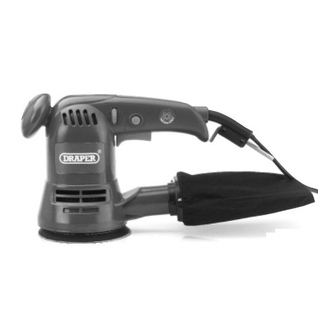- ページ 7
サンダー Draper PT125VのPDF 取扱説明書をオンラインで閲覧またはダウンロードできます。Draper PT125V 12 ページ。 Random orbit sander

IMPORTANT: Make sure that the mains voltage
matches the voltage stated on the machines
rating plate.
THE SWITCH WITH HOLDING BUTTON:
The machine is set to operation by pressing the
trigger ✲✌ (see Fig.3.). To use continuously
squeeze trigger ✲✌. Press button ✳✌ and hold in.
Release trigger ✲✌. Release button ✳✌, the
machine will continue to run. To stop the
machine squeeze trigger ✲✌, button ✳✌ will
automatically release.
SPEED REGULATION:
Depending on the application the rotation speed
can be varied by turning the knurled button ✴✌
(Fig.3).
NOTE: The rotation speed is dependent upon the
pressure applied during working. DO NOT
overload the machine.
The Random Orbital Sander can be used for all
sanding tasks on wood, paint, metal and plastics.
WARNING: The sander must be switched on
before making contact with the surface to be
sanded. Do not stop the sander while it is in
contact with the surface being sanded.
DUST EXTRACTION:
The PT125V comes with a dust collection bag for
use on smaller workpieces. Make sure that the
bag is emptied as soon as it is full, as dust
removal will slow and become less effective as
the bag fills. To remove the dust bag simply
squeeze the tabs ✵✌ (Fig.4) together and the
bag will become free. To reconnect the dust bag
simply push back on until you hear and feel it
locate
VACUUM DUST COLLECTION:
For large tasks the PT125V can be connected to a
vacuum for fast and efficient dust removal. For
example the WDV1100 Draper Vacuum cleaner is
ideal and will connect directly to the dust outlet
port when the dust bag and frame are removed.
(Fig.5.).
IMPORTANT: Disconnect from the power supply
before carrying out any adjustments.
SANDING DISCS:
Are simply pressed onto the sanding pad
(Fig.6.). The holes in the sanding disc must
correspond to the holes in the sanding pad for
maximum dust extraction. To replace the sanding
disc simply pull it away from the pad (the
sanding disc is attached to the pad by a hook
and loop fastening system).
OPERATION & USE
Fig.4.
- 6 -
✴✌
✲✌
✵✌
✳✌
Fig.3.
Fig.5.
